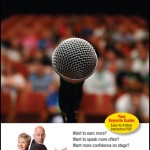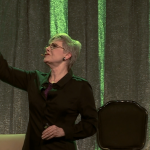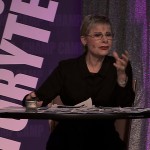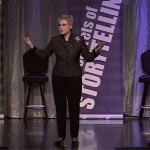Long & Foster Sales Presentation Skills.
Is 2013 the year you double your sales? After our January meeting you will have all the tools. Patricia Fripp is looking forward to being your personal coach.
Create Your Keynote by Next Week Receives Rave Reviews

By Patricia Fripp and Darren LaCroix
Over the last fifteen years Darren and I have met hundred’s of speakers who are not sure what to talk about. We created this program to help all public speakers search their lives for unique and original content.
“This program is like being able to sit down with Darren and Patricia for a whole afternoon after an NSA meeting and having a private workshop where they tell me exactly what to write to perfect my keynote. I can listen to it again and again, and I get to learn at my convenience and at my pace. This program does exactly what it says it does, and it can be summarized in one word: SYSTEM! It’s like shelving that lets you take all the inventory you’ve accumulated through your life experience, your stories, your goals, your audience needs, etc. and know EXACTLY where to put it! This is one of those programs you’ll listen to over and over again because it feels just like having your friends Darren and Patricia over to visit about your business.
So many useful do’s and don’ts. And so many CHOICES on how to do what has been PROVEN to work but in your own unique way. If you charged what this was worth, I could never have afforded it, so thanks for the bargain!
Imagine being able to call your friends Darren and Patricia and ask them to meet you for a cup of coffee just to chat about how to improve your business. The content of this program feels like just that! If you’ve found yourself saying, ‘I’ve got this great story, but I don’t know how to shape it…’ or ‘I just need a way to transition from the stories I know the audience loves into the points the client wants made…’ or ‘I would sure like to have a way to build rapport with the audience in the first 30 seconds or so…,’ this program answers those questions and a whole bunch more that you might not even have thought of.
You can build a keynote from scratch or rethink, refine, or completely rebuild what you’ve already got with this program. So many choices, but no useless clutter. This program was built with action in mind!”
Dr. Burt Smith, CME, CQM, PCM
“It has been exactly one month since I received an advance copy of this product through Darren. I have listened to it every day at Honda University as I drive an hour to and from work. This is a fabulous product packed full of real ideas, tips, and suggestions. It will not do the work for you, but it will keep your work organized and focused as you develop your keynote speech.
I have not started, but I have been mining my life for the ideas that I will use to develop my first keynote speech. The ideas are far reaching. Patricia and Darren, you have taken the mystery out of the keynote writing process. You do not remove the work, but you do eliminate the misstep and wasted effort one would make without this great resource.
Thank you for sharing your experience and process. I will see you on the road and will personally thank you when we meet.
Joe Arnold, DTM, V.P. of Membership, Aspinwall Toastmasters
Read More...Make Your Words Worth $1,000 a Second

by Patricia Fripp, CSP, CPAE
Some people think that if they talk longer, they are giving more value for money. Actually, audiences are eager for content, presented as efficiently and memorably as possible.
Here’s another way to look at it. Transcribe one of your speeches, count the words, and divide your fee by the number of words. This gives you a dollar and cents value for each word.
Now delete all the unnecessary fluff and filler. For example, avoid clichés like “each and every one of you in the room.” How often have you heard speakers say that, adding eight unnecessary words? When your transcription is lean and clean, count the words again. Divide by your fee. Notice how much more valuable each word has become. Make every word count!
One of my coaching clients was a sales manager at the Fairmont Hotel in San Francisco. He was a great salesperson one-on-one, but now he was facing a group of ten. “I’m very nervous,” he confessed. “How do I sell to so many people?” A corporation was debating whether to bring their convention to the city.
Read More...Key Aspects of a Great Presentation

Key Aspects of a Great Presentation
Patricia Fripp Interview Questions & Answers:
• What is the message you hope people take away from your presentations?
My audiences learn powerful, persuasive presentation skills that give individuals and companies a competitive edge.
• How do you prepare for speaking engagements?
When the audience is from one company I interview the clients who are running the meeting for their objectives. Next I talk to the professionals who will be in audience. As my presentations are usually about how to improve presentations I need to know what presentations they deliver and specifically what they say in those circumstances. Every audience knows there are some parts of my presentation that was created just for them.
• Who or what inspires you?
I am inspired by interesting conversations with interesting people, attending theatrical events, visiting museums, seeing moves, and learning something new that makes me more valuable to my clients.
• Can you identify some of the key aspects of a stellar presentation?
A great presentation has compelling content, strong structure, memorable stories, intellectual and emotional connection with the audience, and specificity. Naturally, it needs to be able to improve the business or careers of the audience members.
• How are your keynote presentations unique?
My keynote presentations are entertaining, thought provoking, with immediately applicable advice and an approach to presentation skills that is not the norm.
• Why is it important to be able to sell oneself?
I learned early in my career it does not matter how good you are the world has to know it!
• What types of audiences gain the most from your keynotes?
With thirty years of professional speaking there are few audience types I have not successfully addressed. My messages about improving presentation skills are appreciated by leaders, sales teams, and ambitious professionals in all industries. Many associations have members who speak in their communities as part of the outgoing marketing efforts; they are well suited for my advice and programs.
Darren LaCroix and Patricia Fripp as partners in World Champions Edge Coaching Community.Patricia Fripp and Darren LaCroix’s next coaching camp is in Las Vegas on November 30, December 1 and December 2.
Read More...How to Become a Better Public Speaker and Writer

How to Become a Better Public Speaker and Writer
In my speaking schools and coaching camps we spend a lot of time getting the attendees to focus on the power of word choices. What helps in speaking also helps in writing.
Non specific words such as stuff, thing, tons and bunches drives me crazy.
If you are with me on that you will enjoy these comments. Each word has a visual!
Good luck. If you want to take your speaking to the next level I will be holding our last speech coaching camp of the year November 30, December 1-2 in Las Vegas with Darren laCroix.
Daphne Gray-Grant wrote “I was forced to diagram sentences when I was in high school—bet you young’uns don’t even know what that means—and found it tedious and confusing. The only thing that stuck with me was the definition of a verb as “the action word of the sentence.” It wasn’t until I became a professional writer that I actually cared.
If you care about anything in your writing, care about your verbs. They drive the sentence. Pick the right verb to help your reader zoom along. Watch carefully for offbeat or unusual verbs in your reading, and record them in a notebook or electronic file. Here’s a favorite: “The crowd cascaded along the street before it was swallowed by the park.” A crowd cascading—and being swallowed by a park—isn’t that terrific imagery?
You should work up a sweat to avoid boring “state of being” verbs (any form of “to be”) and instead zero in on verbs with zip or pizzazz: dither, inspect, disdain. Precision helps. After all, sauntering differs from walking or striding. Be specific, and you’ll create a sharper picture in your reader’s mind.
Further, attend to your tenses. If the verb is an automobile, the simple present tense (I eat, you ingest, he chews) is a Corvette. Sleek, with a powerful engine, it goes from zero to 60 in five seconds. Prefer it to the less streamlined present progressive (I am eating). Though this form shows ongoing activity, it can easily gum up your sentence. Most times you don’t need it. Edit down to the simple.
Here’s another tip, beloved of journalists and magazine writers: Take that story or anecdote that seems to belong in the past tense, because it’s something that has already happened, and simply position it in the present. For example: “George McDonald smiled when he heard the news” becomes “George McDonald smiles when he hears the news.” See how that transforms the sentence? Just remember to be consistent. Don’t shift from one tense to another if the time frame of the story remains the same.
Beware a tense known as the future unreal conditional. (Even the name sounds alarming.) The dead giveaway of this tense is the word “would.” Here’s an example: “The vice president would sit at the boardroom table chastising his employees.” The trouble is, “would” signals this to be an apocryphal or imaginary story. Ditch it. Tell real stories instead.
Read More...Building relationships with virtual communication

Thursday, October 11th – 11am Pacific 2pm Eastern
Guest — Patricia Fripp of Fripp & Associates
Topic — Building relationships with virtual communication
Details:
– how to gain a competitive advantage when using virtual communication
– how does a consultant select the best digital marketing tool set
– can YouTube video files out value professionally produced DVD video
– what’s the greatest value from Skype and a virtual office
– what is the time requirement and cost involved
– how will I know if this technique is ‘right’ for me
Dave Williams is the founder and President of Conference Village who designed www.FrippVirtual.com
where Patricia conducts her virtual coaching.
http://yourvirtualhandshake.com/show-schedule/
You can establish a personal connection

By Patricia FrippWhenever and whatever you are pitching, dozens of factors will figure in the final decision of your prospects. All else being equal you have the edge if you can establish a personal connection.
You can establish a personal connection when you take this advice.
Connect emotionally and intellectually so that they like you and trust you more than your competitors. Try these personal edge tips:
•Focus and be sincere. If you appear nervous or unsure you may seem devious or incompetent.
•Divide and conquer. For a group sales presentations shake hands with everyone as they enter the room. Connect with them so you see them as individuals.
•Use technology to enhance your sales presentation not drown it. PowerPoint can keep you on track but it can’t establish trust.
•Keep it simple and memorable. When your prospects have a debriefing afterwards you want them to remember what you said.
•Reinforce your talking points into snappy sound bites. Make them interesting and repeatable.
•Steer clear of technical language and jargon.
•Rehearse your presentation in advance.
•Tell great stories. Prospects are trained to resist a sales pitch but no one can resist a good story well told.
Would you like to hear Patricia Fripp speak on public speaking?
Why not check out one of her professional presentation classes?
Patricia Fripp is THE executive speech coach.
Read More...Want to market yourself?

By Patricia Fripp
There is an old saying, “If you build a better mouse trap people will beat a path to your door.”
That might have been true once but it is not true now. Having the best product or service does not automatically guarantee your success. That is because of a lesson I learned from one of my bosses, Jay Severing. Jay Severing was the Hollywood hair stylist. He said Patricia we only have one gimmick, the best haircut in town. It wasn’t what he said that I found so fascinating but it is who he said it to, Time Magazine, Newsweek, and Playboy Magazine when no one else was talking about men’s hairstyle.
I realized as a young woman that people do business with people they know. People do business with people who do business with them. People do business with people their friends talk about and people do business with people they read about.
Now every time Jay spoke to a magazine or a newspaper he had new clients. Now with the internet, what are you doing to have your press releases, a well optimized website, your articles and newsletters so people can read about you?
People do business with people they know in different formats. Make sure they can’t forget you.
Is this helpful? Would you like to watch the video?
Why not check out where Patricia Fripp is speaking?
Want to improve your public speaking then learn from the best!
Want to improve your public speaking then learn from the best!
By Patricia Fripp
I am a great believer that you can tell more about a speaker in a ten minute speech than one that goes on for 2 hours. What do you think? I hope you will appreciate why I am known as THE Executive Speech Coach.
By the way…did you know you can learn the public speaking techniques that have helped me build a great career?
Read More...How to Improve Your Public Speaking: Breathe Fresh Air into Your Older Speech Content

by Patricia Fripp, CSP, CPAE
If you are a dedicated public speaker or have to deliver presentations as part of your job, perhaps you have noticed you can get bored with your own content. No matter how solid or well designed your keynote speech or corporate presentation is, it is too easy to go on autopilot, and your well-crafted speeches can lose their luster. How can you keep the excitement alive? By falling in love with your public speaking material all over again!
When you internalize your stories and message well, you can forget thinking about what is coming next and focus on your audience. Gene Perret was head writer for Bob Hope for 30 years. He said, “Fripp, you need to know your content so well the words fall flawlessly from your lips.”
My first lesson about falling in love with my own material came from a well-known speech coach Ron Arden. My mastermind group Speakers Roundtable brought in one of the leading speech coaches in North America, Ron Arden, to work with us. We are all Hall of Fame keynote speakers and knew our speeches inside out.
You can feel confident we had memorized our presentations. Yes, we could still be flexible and build in spontaneity. We knew our core messages, and I am sure I was not the only one getting not bored, just less excited.
Read More...